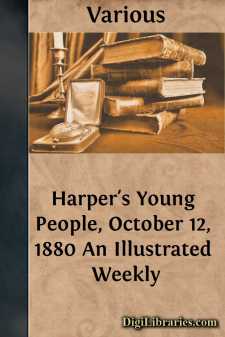Categories
- Antiques & Collectibles 13
- Architecture 36
- Art 48
- Bibles 22
- Biography & Autobiography 813
- Body, Mind & Spirit 142
- Business & Economics 28
- Children's Books 17
- Children's Fiction 14
- Computers 4
- Cooking 94
- Crafts & Hobbies 4
- Drama 346
- Education 46
- Family & Relationships 57
- Fiction 11829
- Games 19
- Gardening 17
- Health & Fitness 34
- History 1377
- House & Home 1
- Humor 147
- Juvenile Fiction 1873
- Juvenile Nonfiction 202
- Language Arts & Disciplines 88
- Law 16
- Literary Collections 686
- Literary Criticism 179
- Mathematics 13
- Medical 41
- Music 40
- Nature 179
- Non-Classifiable 1768
- Performing Arts 7
- Periodicals 1453
- Philosophy 64
- Photography 2
- Poetry 896
- Political Science 203
- Psychology 42
- Reference 154
- Religion 513
- Science 126
- Self-Help 84
- Social Science 81
- Sports & Recreation 34
- Study Aids 3
- Technology & Engineering 59
- Transportation 23
- Travel 463
- True Crime 29
Harper's Young People, October 12, 1880 An Illustrated Weekly
by: Various
Categories:
Description:
Excerpt
COACHY.
BY ELINOR VEY.
The first time I ever saw Coachy she was scratching about on the garden walk, kicking the dirt out in two ways behind her, and then nimbly hitching back a step or two and staring and pecking at the hole that she had made. Every little while she said something to herself in a comical drawling tone, standing on one foot, and looking up at me with curious eye, as if wondering who I was, and what in the world I was there for. But who was Coachy?—an old yellowish-brown hen, all tousled and sort of round-shouldered. As I was laughing quietly at this old hen scratching, and kicking, and pecking, and crooning about on the garden walk, it occurred to me to toss the least bit of a stone at her. So picking one up, I took aim, when, click! click! upon the porch I heard a pair of slippers. They were down the steps in no time, with their cunning toes pointing straight toward mine. I put that stone into my pocket, and took off my hat to "little slippers." They were blue as the softest blue sky—little slippers—and ever and ever so small. Mine had purple worsted flowers all over them, big flat heels, and were ever and ever so large. Inside those little slippers stood the sweetest mite of a lady the world ever saw; while inside old "flat heels" was the fattest and fondest Uncle John.
Bessie Rathbun's cheeks were about the color of an oleander blossom, her small red mouth was about the color of a cranberry, and her two wide-open eyes about the color of her slippers. Her hair hung in yellow fuzzy curls away down to the strings of her apron; and it always seemed to me there must be a gold dollar rolling off the end of each curl, each end was so round and gold yellow. Dainty Bessie!—and what do you suppose? Why, she was deep in love with that old brown hen. Many and many a time she had sent me scraps of news about her wonderful Coachy, and had wished and wished that I would come and see her for myself. So when, one day, a letter came from Bessie's father, asking me if I would please hurry over to Featherdale to take charge of his house, and his silver spoons, and his little daughter, while he took a journey with his wife to visit a sick friend, I just threw my papers and pens into my valise (I was writing a lecture then), jumped aboard the first train, and went. So here we were together, on a breezy bright June morning—Bessie and Coachy and I.
"There she is, uncle—there's my Coachy!" cried Bessie, as she slipped from my arms. "Come, darling, come;" and Coachy spread out her wings, and rushed toward her little mistress, who eagerly bent down and took her. She kissed her brown back, and from a snowy apron pocket gave her corn, and even while eating, this funny old hen brokenly hummed a tune.
"Let's go on the porch with her," said Bessie at last. So we settled on the porch, with Coachy nestling between us.
"She isn't what you may call a very handsome hen—now is she, Bessie?" laughed I.
But Bessie scarcely smiled. "If you knew something that I know," said she, "you wouldn't make fun of her."
"Why—what?"
"Why, she was a poor orphan chicken—an' a dog killed her mother—an' she had a dreadful hard time getting grown up as big as she is now....












